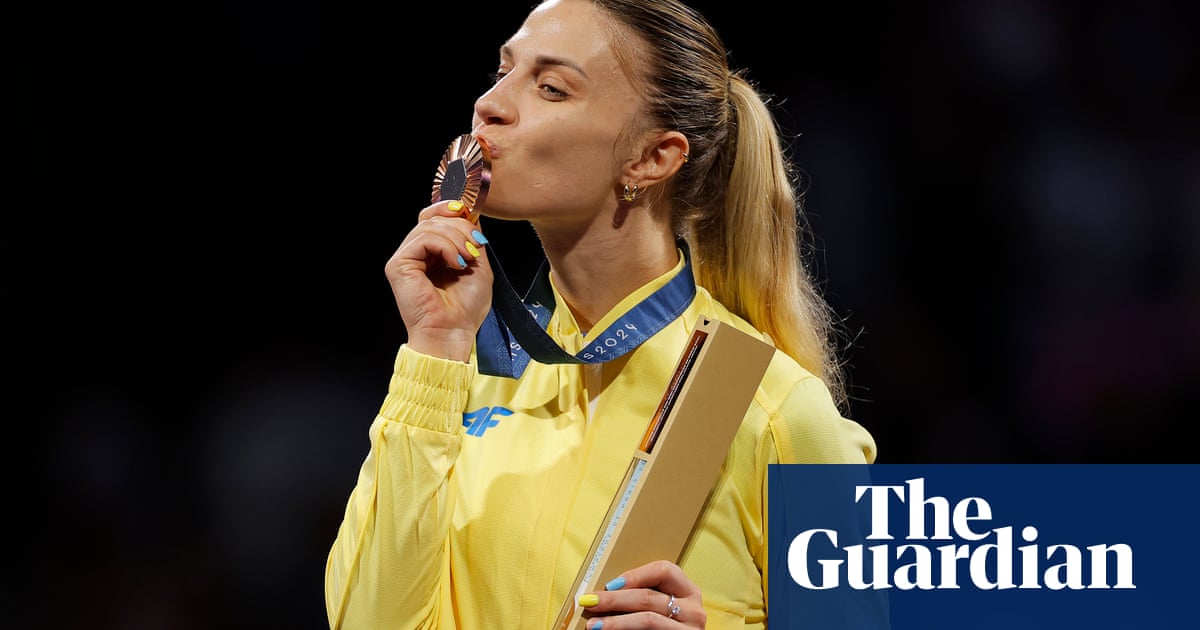This was for Ukraine. It was for the people back home where every victory, of whatever kind, is laden with meaning few outside can understand. It was for those who have lost their lives while fighting to ensure the country’s athletes remain free to compete. It was for Olha Kharlan’s family in Mykolaiv, where her parents spent months living in their basement under continued Russian attack. And it was for the show of principle that almost denied her the chance to experience this at all.
Kharlan collapsed to the ground in tears after beating Choi Sebin, the sparky South Korean, in sudden death to win bronze in the women’s sabre. She leapt into the arms of her coach, Andrea Terenzio, before kissing the blue and yellow coloured mask through which she had glimpsed history. While she had hoped to roll back the years with gold in what is almost certainly her final Olympics, how beautifully fitting it was that a genuine national icon should deliver Ukraine’s first medal of Paris 2024.
“This is a message to all the world that Ukraine will never give up,” said an exhausted Kharlan, who had just proved the point spectacularly. Her evening looked sure to end on a regretful note when Choi, at 23 a huge prospect in this sport, stretched ahead by six points. “Come on Olha!” came a cry from the crowd, and something astonishing stirred. An arena that had been bathed in patriotic fervour all day, and would explode again an hour later when a local favourite, Manon Apithy-Brunet, won the title, found the energy and generosity to shift focus.
They began chanting for Kharlan, a six-time world champion who already had four Olympic medals to her name. An 11-5 deficit became a 12-11 advantage and, in an impossibly tense final set of exchanges, a decisive turnaround to 15-14. “I’m just thankful to the piste that I made it,” she said. “This medal is totally different. It’s special because it’s for my country. All the athletes here are going through the war. We are showing that we can fight, and I showed it somehow.”
The cavernous Grand Palais was a magnificent venue: another ingenious use of Parisian props that gave this entire occasion a sense of genuine awe, two sheer stands cascading down towards the podium from beneath the glass-domed roof. Before the evening’s showcase bouts the contenders announced themselves regally on a balcony overlooking the scene, walking down a curved staircase before immersing themselves in the cut and thrust.
In getting here, Kharlan had faced bigger obstacles than a buoyant local crowd whose noise eked every decibel out of this hall’s supreme acoustics. In a narrow Olympic context this ended up being France’s night, a hugely absorbing day’s entertainment ending with Apithy-Brunet beating her compatriot Sara Balzer. But the significance of her achievement, at a Games unlike any other for her compatriots, will resonate more widely.
A year ago, Kharlan was disqualified from the world championships for refusing to shake hands with her defeated Russian opponent Anna Smirnova. It was devastating: she felt destroyed, bereft, misunderstood, and knew her ejection would make qualification for the Olympics impossible. A personal intervention from Thomas Bach, the IOC president and a former fencer, meant common sense prevailed and the road to Paris opened up.
There was more than a flicker of curiosity during the afternoon when, after sailing into the last 16, she was bracketed to face the Azerbaijan representative Anna Bashta. Until 2019 Bashta competed for Russia, where she was born. The 28-year-old switched nationality in order to circumvent the queue of Russian fencers in front of her in what, when she appeared in her new nation’s colours at Tokyo 2020, became a controversial move back home.
after newsletter promotion
Kharlan overcame her comfortably before the pair shared a handshake and a brief hug, Bashta explaining later that they were long-standing acquaintances. Had Bashta switched nationality after Russia’s full-scale invasion of Ukraine in February 2022, the situation may have been treated differently.
The ultimate prize flickered tantalisingly until, in her semi-final, Kharlan came up against a vigorous Balzer and that reverberating wall of French pride. If that was one miracle too far, she would send Ukraine’s sizeable contingent of well-wishers into paroxysms of delight in the bout for bronze. “A lot of pressure because you want to dedicate it,” she said of the weight carried into that decider. “You want to do it for your family, for yourself. All the sacrifices, all the news, all the tragic moments when Russia bombed and killed people. We all take it, so that’s why it’s tough.”
For Kharlan, that craving for a departure bathed in gold will persist until the women’s team event on Saturday. It would take some doing to top the picture of release, relief and sheer emotion that embossed her evening. She made it to Paris through everything, and how.
